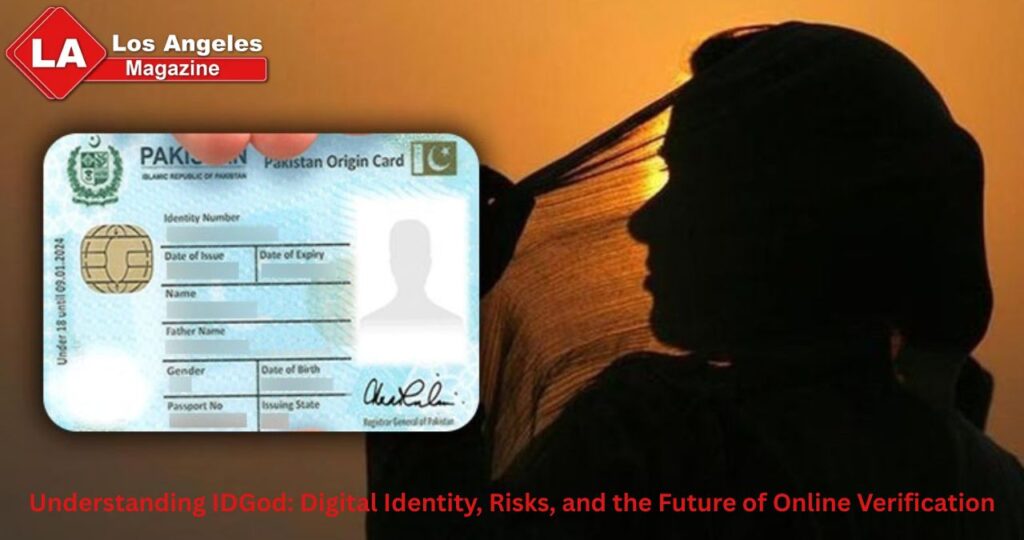In the modern digital age, identity has become one of the most valuable assets a person owns. Every interaction online — from opening a bank account, ordering products, accessing age-restricted platforms, or even subscribing to streaming services — requires some level of identity verification. Within this ecosystem, the term “IDGod” has gained attention. While often associated with the controversial practice of creating or selling fake IDs, the discussion around IDGod also opens doors to broader issues of cybersecurity, online verification systems, personal data protection, and the risks of digital impersonation.
This article explores the concept of IDGod, its origins, the risks associated with using fake identification, and how businesses and individuals can prepare for the future of online identity verification.
What is IDGod?
IDGod is widely known as the name of a platform or network that specializes in producing fake identification cards. Originally associated with counterfeit driver’s licenses and student IDs, the name has since become synonymous with the underground trade of digital and physical fake IDs.
- Primary Purpose: These fake IDs are often used to bypass age restrictions, purchase alcohol, enter clubs, or access services restricted to adults.
- Expansion into Digital: Over time, IDGod has also been linked to online identity forgery, where digital credentials are replicated or altered to access platforms.
- Cultural Recognition: In some online forums and communities, the word “IDGod” has become a generic term for fake ID providers.
While the name may carry a sense of rebellious humor among students or young people, the legal and ethical consequences of engaging with such platforms are extremely serious.
Why Do People Seek Fake IDs?
The popularity of services like IDGod highlights the demand for alternative identity documents. Common motivations include:
- Age Restrictions: The most frequent reason is underage individuals wanting access to alcohol, tobacco, or nightclubs.
- Peer Pressure and Social Image: Young people may feel left out if their friends are attending age-restricted events.
- Accessibility Issues: In some countries, obtaining a government ID can be slow or bureaucratic, leading individuals to seek shortcuts.
- Online Anonymity: With many platforms requiring ID verification, some use fake IDs to maintain privacy or create multiple accounts.
While these motivations might seem harmless to the individual, the consequences extend far beyond the user.
Risks and Consequences of Using IDGod
1. Legal Risks
Possession or use of a fake ID is a criminal offense in most countries. Penalties range from fines and confiscation to jail time, depending on jurisdiction. For students, a criminal record can also affect scholarships, job opportunities, and visas.
2. Cybersecurity Risks
Purchasing fake IDs online exposes individuals to scams and fraud. Since these websites operate illegally, users risk:
- Having their payment information stolen.
- Becoming victims of phishing or ransomware.
- Their personal data being sold on the dark web.
3. Ethical Risks
Fake IDs compromise the integrity of businesses that depend on accurate age verification, such as bars, casinos, or online platforms. It can also contribute to issues like underage drinking, addiction, and fraud.
4. Personal Safety Risks
Fake IDs often lack the security features of genuine documents. In situations requiring real verification — such as police checks, travel, or emergencies — presenting a fake ID can lead to immediate detention and investigation.
IDGod in the Digital Era
The emergence of IDGod also reflects deeper concerns about the limitations of current identity verification systems. Many businesses still rely on outdated methods of ID checking, which can be bypassed with convincing counterfeits. This has given rise to the need for next-generation digital verification tools, such as:
- Biometric Authentication: Using fingerprints, facial recognition, or retina scans to verify identity.
- Blockchain-based IDs: Secure and tamper-proof digital identities stored on decentralized networks.
- AI-powered Verification: Artificial intelligence systems that can detect micro-errors in fake IDs, such as inconsistent fonts, hologram placement, or pixel-level flaws.
In this way, the controversy surrounding IDGod is pushing industries toward more advanced, reliable, and future-proof verification solutions.
The Role of IDGod in Pop Culture
Interestingly, IDGod has also become a pop culture symbol. It is frequently referenced in movies, TV shows, and online memes as a rebellious tool for young people. However, this normalization is dangerous because it reduces awareness of the serious risks attached to its use.
For example:
- In college movies, fake IDs are portrayed as a “fun shortcut” rather than a legal offense.
- On social media, some influencers even joke about buying fake IDs without discussing the risks.
This glamorization can mislead teenagers into thinking IDGod is harmless. Parents, educators, and policymakers need to bridge this gap by raising awareness and educating young people about real consequences.
Preventing the Spread of Fake IDs
The growing challenge of ID forgery requires both technological innovation and public education. Key strategies include:
- Stronger Verification Systems: Businesses should invest in advanced verification tools to minimize reliance on manual checks.
- Awareness Campaigns: Schools and colleges should highlight the legal and personal risks of fake ID use.
- Government Collaboration: Law enforcement agencies need stronger cross-border cooperation to tackle the international networks behind IDGod-like platforms.
- Personal Responsibility: Individuals should understand that fake IDs are not only illegal but also unsafe, especially in the digital marketplace.
The Future of Identity Verification Beyond IDGod
The rise of IDGod has triggered an important conversation: how do we create a safer and more secure identity verification system in a digital-first world?
- Integration with Mobile Devices: Many governments are experimenting with digital driver’s licenses or national IDs stored securely in smartphones.
- Passwordless Authentication: Instead of usernames and passwords, users may rely on biometric verification or digital wallets.
- Universal Digital Identity Systems: Organizations like the UN and World Bank are advocating for global identity solutions to reduce fraud and improve access to services.
Ultimately, the fight against fake IDs like IDGod is part of a broader movement toward stronger digital trust in every sector of life.
Conclusion
The keyword IDGod may first evoke images of fake IDs and rebellious nightlife, but the subject runs much deeper. It represents the growing tension between outdated verification methods and the need for advanced, secure digital identities. While fake IDs might seem like a quick solution for underage individuals or those facing bureaucratic hurdles, the risks far outweigh the benefits.
From legal consequences and cybersecurity threats to the ethical implications of undermining business trust, IDGod serves as a reminder that identity is sacred in the digital age. The future lies not in counterfeit solutions but in innovative verification technologies that protect both individuals and businesses. By embracing these innovations, society can reduce the appeal of IDGod while moving toward a safer, more trustworthy digital ecosystem.



